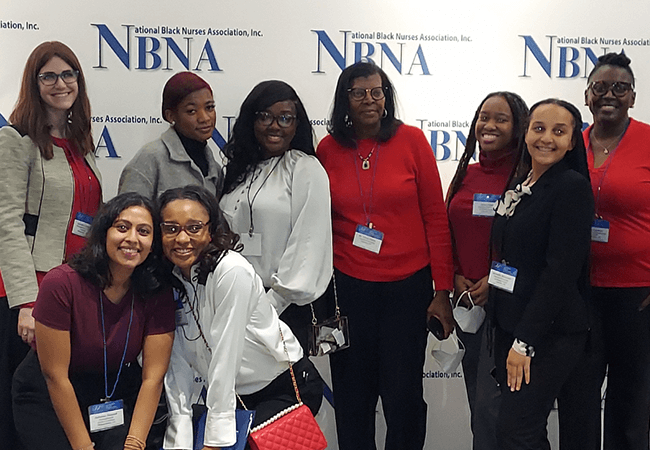
Mar 15, 2022
Lincoln University Student Nurses Thrive in HBCU Mentoring Collaboration

A diverse nursing workforce means more access to care, and better care, especially for people in communities that have been historically underserved, such as communities of color and rural communities. Efforts are underway across nursing to diversify the workforce so it better reflects the communities it serves.
One such effort comes in the form of mentoring programs at nursing schools that have traditionally served students of color, programs the Future of Nursing: Campaign for Action has been supporting for several years. The Campaign, an initiative of AARP Foundation, AARP, and the Robert Wood Johnson Foundation, provides in-person and virtual technical assistance to deans and nursing faculty at Historically Black Colleges and Universities (HBCUs) and schools that serve Hispanic and Native American nursing students, and to its state-based Action Coalitions. The goals are to develop mentoring programs that can improve retention and graduation rates and increase the graduates’ passage rates of the National Council Licensure Examination (NCLEX), which is required to practice nursing.
In Pennsylvania, one HBCU mentoring program is off to a promising start. Beginning in 2020, the Pennsylvania Action Coalition/Nurse Diversity Council partnered with Lincoln University in Lincoln University, Pa. a historically black university, to provide mentoring and ongoing leadership development for nursing students.
The idea took shape during a pilot mentor-training program for eight HBCUs in the mid-Atlantic region, which had been convened by the Campaign for Action, AARP, and the Office on Minority Health in the Department of Health and Human Services (HHS).
Monica Harmon, MSN, MPH, RN, co-chair of the Pennsylvania Action Coalition Nurse Diversity Council, was there, along with the director of Lincoln University’s Department of Nursing. As they got to talking about how to best support Lincoln’s nursing students, they “kept coming back to professionalism,” Harmon explained. Nursing school is uniquely demanding. Nursing students must attend not only classes but also clinicals in a health care setting. They also have to prepare for and pass the NCLEX. “In many ways, their careers begin while they are still in school,” she said. “We wanted to help them transition from college student to nursing student to professional nurse.”
This young program is moving forward this year with a cohort of 21 nursing students and their 21 mentors – all professionals drawn from the Pennsylvania Action Coalition’s membership. Mentors and mentees connect at least once a month – ideally in person, but by phone, video or text if necessary. The students also get automatic memberships in professional associations, including the National Black Nurses Association (NBNA). In April, they will come together for panels on topics such as how to interview, write a resume and hone their individual leadership to secure their first registered nurse (RN) position.
These future nurses are also learning that policy matters to their chosen profession, and recently joined the NBNA for a Capitol Hill lobby day. As part of their preparation, the students had a training on using the Campaign for Action’s Health Equity Toolkit and learned about a variety of critical issues, including nurse education, workforce issues, Black maternal and infant health, and inequities in telehealth and in cardiac health.
Adriana Perez, PhD, CRNP, ANP-BC, FAAN, FGSA, Assistant Professor of Nursing at the University of Pennsylvania School of Nursing, who also serves as a diversity adviser to the Campaign, has been instrumental in building Lincoln University’s mentoring program. She shared highlights from a survey given to the first group of student mentees. “Eighty-nine percent told us they saw the program as helpful, and 75 percent said that their mentor was a good match, and someone they plan to keep in touch with. And impressively,” noted Perez, “100 percent maintained a GPA of 3.6 or higher in their last semester and were on track with their post-graduation goals.”
Read more about how the Campaign supports mentoring programs like Lincoln University’s and find links to some key resources in this article: https://campaignforaction.org/resource/mentoring-for-better-health/.
